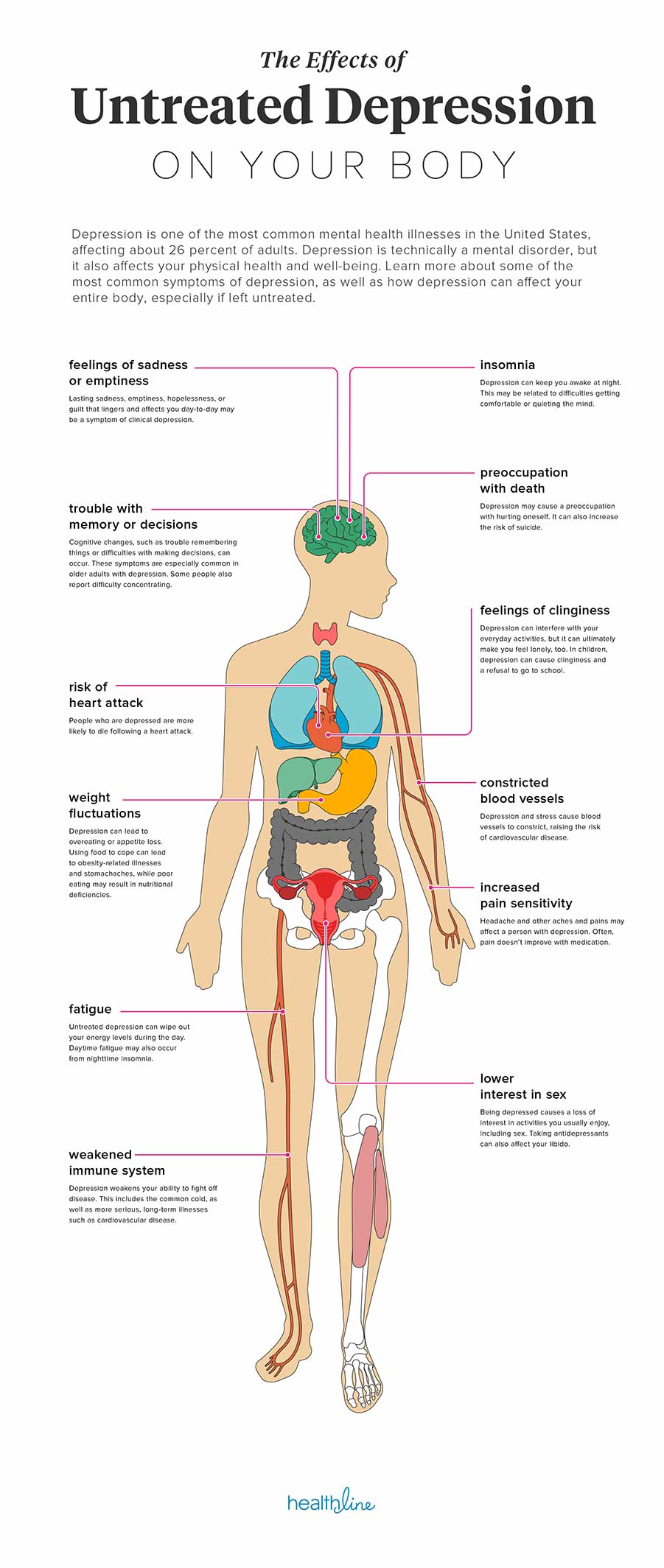Reviewed by Phillip Waite, Ph.D.

“First and foremost, when we talk about depression, all margins and boundaries are blurred,” said Adam Rubinstein, MD, a board-certified internal medicine physician at Condell Medical Center in Libertyville, Illinois.
“Depression is slightly different in each individual. A range of variables, including other illnesses, genetics and the patient’s environment influence how depression presents itself in each person.”
Symptoms
Depression can take many forms, including an acute grief reaction, seasonal affective disorder (SAD), dysthymia, and the most widely known — major depression.
Symptoms of depression may or may not include changes in weight, feelings of guilt or worthlessness, changes in sleep habits, inability to concentrate and/or feelings of wanting to hurt oneself.
Causes
The causes for depression are just as complex as the illness itself, however researchers have made major strides toward greater understanding in the past five years. Depression can be passed on from grandparents to parents to children, but external stressors also play a role.
According to Dr. Rubinstein, the latest depression studies show that exposure to a major stressor before age 12, such as experiencing the death of a loved one or other tragedy, can lead to inefficient processing of stress hormones and depression. In addition, exposure to more major stress later in life can also further increase a person’s chances of developing depression.

Major Depression
To fit the diagnosis of major depression, a patient must have severe feelings of sadness or completely lack the ability to feel joy every day for at least two weeks. Many people with major depression can’t pinpoint a reason for their sadness.
Research has shown that the abnormalities in processing the hormone serotonin, a key neurotransmitter (chemical messenger) in the brain, can cause major depression.
Antidepressant medications called serotonin reuptake inhibitors (SSRIs), such as Prozac, Zoloft, Paxil, Celexa, and Luvox, relieve major depression by restoring the brain’s chemical balance.
Acute Grief Reaction
The same medications prescribed for major depression are also effective for treating acute grief reactions, which have similar symptoms to major depression.
They are triggered by a specific loss in a patient’s life, such as the death of a loved one, divorce or a job change. Acute grief reactions last no more than a year.
Seasonal Affective Disorder (SAD)
People with seasonal affective disorder (SAD) become depressed when not exposed to enough sunlight. The most difficult seasons for SAD patients are fall and winter, when days are shorter and skies are cloudier.
Treatment for this type of depression involves shining a full spectrum light (that most closely matches the qualities of pure sunlight) on the patient for at least one hour each day.
Dysthymia
Although dysthymia is less common than major depression, Dr. Rubinstein noted that at least 5 percent of patients who visit an internist suffer from this disorder. Because dysthymia is defined by a constant, less-than-happy mood that patients can tolerate for years and years, it is more difficult to recognize. However, it usually responds to antidepressants.
On The Horizon
Dr. Rubinstein predicts that with the knowledge gained from the human genome project, scientists in the next 10 to 20 years will be able to pinpoint exactly which genes contribute to each kind of depression. He also hopes that these findings will lead to more and more specialized medications to treat the seemingly endless nuances of depression and other mental disorders.
Did you find this article helpful? Join us at HealingWell for support and information about Diabetes. Connect and share with others like you.
Carla Esser Lake is a writer employed by Condell Health Network in Kenosha, WI. Serving residents of Lake County, Illinois, a suburban area north of Chicago, Condell Health Network includes Condell Medical Center, Condell Acute Care Centers, Centre Clubs, the innovative Condell Day Center for Intergenerational Care, Pediatric Alternatives in Creative Therapy (PACT), Condell Medical Buildings and Condell Home Health Systems.




